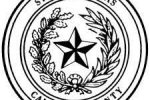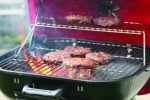Spike Strawn: proud marine, tanker and U.S veteran
By Todd A. Blomerth
Special to the LPR
Editor’s note: this is part one of a three-part story by Todd A. Blomerth
I moved to Lockhart in late 1981. Soon I started hearing about a fellow named Spike Strawn. He and his son Fla owned S&S Fertilizer with an office in a small building on Highway 183 about where the McDonald’s is now. S&S also had a crop-dusting service. Word was that you didn’t want to get crosswise with Spike, as he was someone who didn’t put up with a lot of guff or suffer fools lightly. He was a proud United States Marine who’d fought for our country during World War II, and his training, background, and combat experience made him a fearsome adversary.
When I finally met Spike, I concluded that everything I’d heard was true. Rawboned, tough as shoe leather, and plain spoken to be sure. But there was another side to Spike Strawn. He wasn’t some caricature. He was complex, highly intelligent, often thoughtful man. Sure, he’d let you know when he thought your thinking wasn’t on course. But he was a loving father and grandfather, a raconteur, and, if he decided you were okay, your best friend.
In short, Spike was a living, breathing example of someone whose family had survived the Great Depression, who went through four major island landings in the Pacific against America’s most ferocious and merciless foe, and who’d proved to himself and others that he had what it took. Spike had grit.
Cecil DeFla “Spike” Strawn was born on 4 January 1922 in Lytton Springs, Texas, the third of eight children of Littleton Lawson “Dill” Strawn and Beatrice Lillie (Ward) Strawn. Besides farming, Dill did whatever it took to put food on the family’s table. Dill was a gifted mechanic and could fabricate parts for just about anything. When he wasn’t farming, he worked for various oil companies in the area. Dill also played semi-pro baseball for company teams. Beatrice took care of the growing family. She gardened, canned, cooked, and ensured that Jenella, Helen Louise, Spike, Doyle Ray, Marjorie, Juanita, Pat and Herschel were clothed and clean. The 20s and 30s were lean times, and everyone in the family was expected to contribute to keeping food on the family table.
Schooling started in Lytton Springs. The place had become an oil boom town in the mid-1920s. At that time, it boasted four grocery stores, a confectionary, a barbershop, and Masonic Lodge, as well as several churches. Life was precarious. Spike would often walk to school, sometimes barefoot, even in the winter. In the second grade, he contracted pneumonia and stayed in bed for almost two months. There were no antibiotics. As he recalled in 1995, “they rubbed you with liniment and hoped for the best.” He survived, but a chest x-ray taken when he enlisted in the Marines showed his right lung stopped growing as a result of the disease. It never slowed him down. In the sixth grade, his class had to submit to a series of twenty-one shots because of a rabid dog, which Dill eventually shot.
In high school, Spike played six-man football and basketball. The oil boom was dead by this time, and Lytton Springs suffered mightily. He landed a job earning seven and a half cents an hour picking and sorting tomatoes. A long day would net him 60 to 80 cents, which was substantially more than many grown men were making. Later, he pulled corn and picked cotton. At one point, he earned 40 cents cutting and shucking corn for his uncle. At the end of the week, he’d have $2.50 – a princely sum.
Entertainment was simple. Square dances (without instruments, and only with singing), or catching a ride into Lockhart to see a movie. His best friend was his cousin, Frank Coopwood, Jr. The price of an evening in the county seat: 15 cents for the show, 10 cents for a hamburger, and 5 cents for a Coke.
War news had become commonplace in the late 1930s. Hitler’s Germany had bluffed France and England and recovered Sudetenland, stolen Czechoslovakia, and absorbed Austria. Franco’s Nationalists, with the aid of Nazi Germany and fascist Italy was quickly putting finished to Republican Spain. China was under the boot heel of the Japanese military, which had killed over 200,000 civilians in what was rightfully called “the Rape of Nanking.”
Most Americans were adamant that their country shouldn’t involve itself in another world conflict. Over intense opposition, the first peacetime draft was enacted in mid-1940. Then in late 1940, the National Guard was nationalized for one year. The country slowly awoke to the reality that “the Arsenal of Democracy” needed to do much more than talk about helping its oldest ally, Britain. Any doubts as to the extent of the conflagration were put to rest when Germany turned on a fellow aggressor and attacked the Soviet Union in June of 1941.
Meanwhile, the United States imposed an embargo on steel and oil heading toward Japan. It was the last straw to the militarists controlling the Empire’s government. Already badly and surprising beaten when the Japanese Army made a move against the Soviets in Siberia and Mongolia, it turned its interests south, toward British and Dutch colonies… and the American Philippine Commonwealth.
Then came the surprise attack on Pearl Harbor. America was “all in.” Less than a year later, on November 3, 1942, Cecil DeFla Strawn enlisted in the United States Marine Corps. After a night in San Antonio’s Crockett Hotel, he and 98 other men from the area were loaded on a train for San Diego, California. Three long days later, they marched two miles to Camp Pendleton, had their heads shaved, and met the drill instructor. The DI quickly assured them that the training base’s colonel was “Big Jesus,” that the DI was “Little Jesus,” and that **** flowed downhill. Weeks of boot camp ensued, and then more training on the rifle range.
Spike asked to become a tanker, and surprisingly, the Marines agreed. Because the USMC didn’t have its own armored school, he spent several months at the Army’s Armored School at Fort Knox, Kentucky. Dill Strawn, determined to see his son, rode a packed train from Texas, standing up the entire way, and spent four days at Fort Knox, sleeping surreptitiously in the barracks with the Marine trainees.
As soon as he returned to California, Spike and his fellow tankers were shipped to Hawaii and became part of a replacement detail. On the Big Island, he and three others were assigned to the 22nd Marine Regiment. He was about to enter the war. The 22nd Marines and its men soon learned they were to be part of a landing force in the Marshall Islands. Spike’s life would never be the same. 


